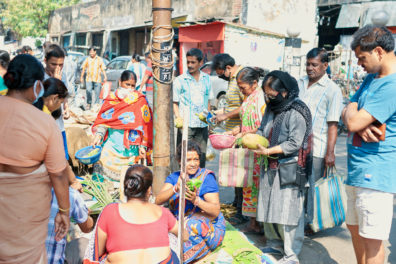Informal Tax
While research has historically focused on formal systems of taxation and user fees, there is mounting evidence of the importance of “informal” taxation for average taxpayers in much of Africa. While lying outside of statutory laws, the “tax-like” payments – which include informal user fees, informal contributions to community development projects, and informal payments to both state and non-state officials – impose a significant burden on many taxpayers, while playing a critical role in financing local public goods and services and shaping broader local governance. Our research aims to map the extent, composition and experiences of these payments, and to understand their implications for livelihoods, fiscal decentralization, service delivery and broader local governance and reform.
Publications:
The importance of tenure security for development and wellbeing is often reduced to questions about how titles can guarantee rights, overlooking the contested and layered nature of property rights themselves. We use the case of Lagos to analyse property rights as ‘analogue’ rather than ‘digital’ in nature – things that only exist by degree, where…
In this paper we examine market taxation in Dar es Salaam from a gender perspective. We do not find any evidence of gender bias in the way market traders are taxed, but we do find a major gender issue that we did not expect – toilet fees. Female traders pay up to 18 times more…
This paper considers how men and women in eastern and northern Sierra Leone interact differently with formal and informal revenue collection. It argues that the literature on tax and gender equity needs to be expanded in low-income countries to pay greater attention to the ways that citizens pay for public services in practice. It shows…
In low-income countries, citizens often pay ‘taxes’ that differ substantially from what is required by statute. These non-statutory taxes are central to financing both local public goods and maintaining informal governance institutions. This study captures the incidence of informal taxation and taxpayer perspectives on these payments. We find, first, that informal taxes are a prevalent…
Recent research has cast light on the variety of informal payments and practices that govern the day-to-day interactions between traders and customs agents at border posts in low-income countries. Building on this literature, this paper draws on survey and qualitative evidence in an effort to explore which groups are most advantaged and disadvantaged by the…
This ICTD Research in Brief is a two-page summary of ICTD Working Paper 74 by Vanessa van den Boogaard, Wilson Prichard and Samuel Jibao. This series is aimed at policy makers, tax administrators, fellow researchers and anyone else who is big on interest and short on time. Governance practices in peripheral regions of low-income countries…
The notion of tax equity raises difficult questions. There is no single right definition of the term, and it is very hard to measure precisely the distributional effects of taxation and fiscal activities, especially in low-income countries. This brief seeks to clarify definitions, evidence and points of potential disagreement when it comes to tax equity, and puts forward eight key elements of a potential agenda for equitable taxation.
Tax justice has become a popular concept, and a number of international tax justice campaigns have exposed aspects such as the unfairness of tax havens and harmful tax breaks. Yet, the idea of tax justice at the local level is less well-known. The impact of campaigns to end tax havens and harmful tax competition may…
Taxing Africa is an accessible and comprehensive introduction to the crucial debates around taxation and development in Africa. Taxation has been seen as the domain of charisma-free accountants, lawyers and number crunchers – an unlikely place to encounter big societal questions about democracy, equity or good governance. Yet it is exactly these issues that pervade…
Recent research has cast light on the variety of informal payments and practices that govern the day-to-day interactions between traders and customs agents at border posts in low-income countries. Building on this literature, this paper draws on survey and qualitative evidence in an effort to explore which groups are most advantaged and disadvantaged by the…
Blogs:
ICTD Informality and Taxation blog series The ICTD’s Informality and Tax programme seeks to conduct, connect, and support novel research around the relationship between tax and informality. To introduce some of the central areas of research in this area and highlight relevant questions for policymakers and academics alike, we will accompany our work with a…
As the world grapples with the consequences of the COVID-19 pandemic, vulnerable workers in the informal sector in the global south have been hit hard. Their health is disproportionately at risk. As, for example, vendors working in close quarters and heavily reliant on face-to-face interactions or as frontline care-workers in households, the nature of their…
With over 16,000 deaths globally and the number of cases growing each day, the calamitous impacts of the novel coronavirus (COVID-19) are already being felt. As the virus continues to spread, the human impact in the Global South has the potential to be catastrophic as it strains weak and underfunded health systems. The economic impacts…
Research Projects:
This research project explores informal taxation along the Dimapur-Imphal highway in conflict affected Northeast India. It seeks to map and explain the type of taxation (progressive, regressive etc), the manner of this collection (ad-hoc or regularised), the levels of perceived coercion, and the variations in these across armed groups, focusing on the taxes taken from…
In this project, we aim to investigate the role ethnicity plays in shaping attitudes toward taxation and the state. In particular, does ethnicity or other vendor-specific attributes attenuate (or reinforce) the effect of improved information on formal tax compliance and pro-tax attitudes? The proposed qualitative research builds upon and is informed by novel findings that…
One of the foremost challenges to state-building in weak states is the collection of sufficient revenue for the government to supply public goods. If weak states seek to expand the size of their tax base and the overall revenue collected, can improved information or other appeals boost pro-tax attitudes and formal tax compliance? This project…



